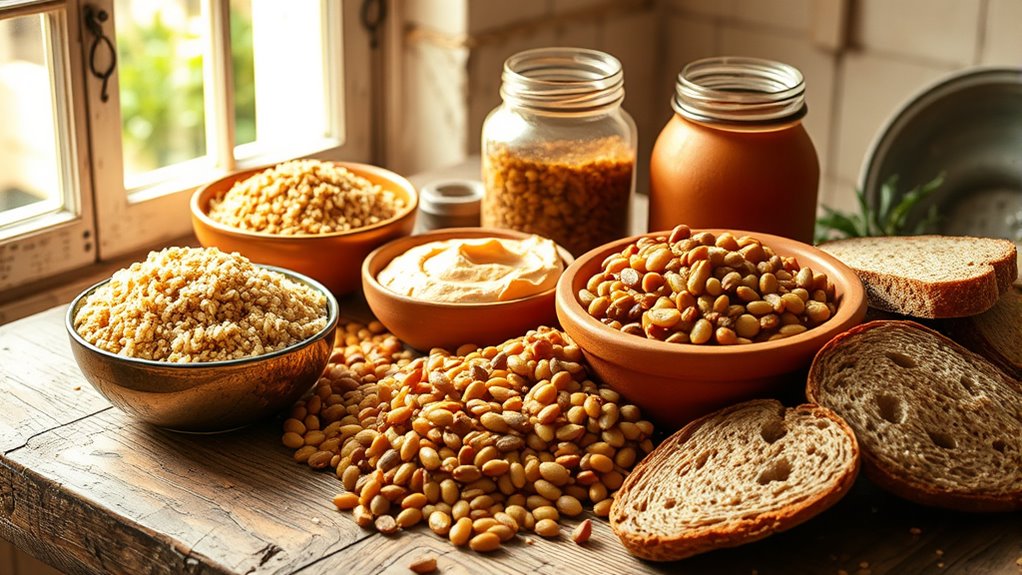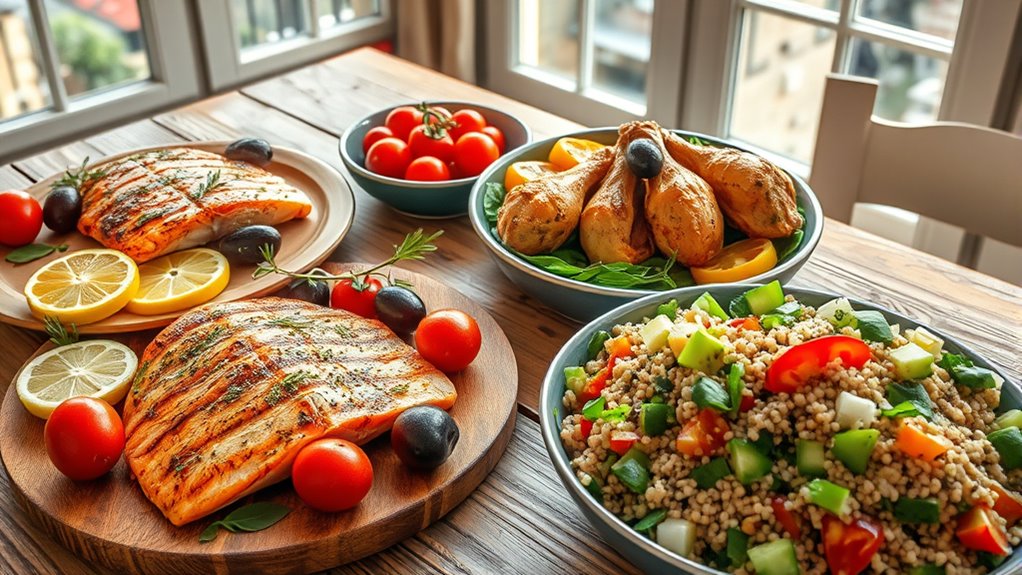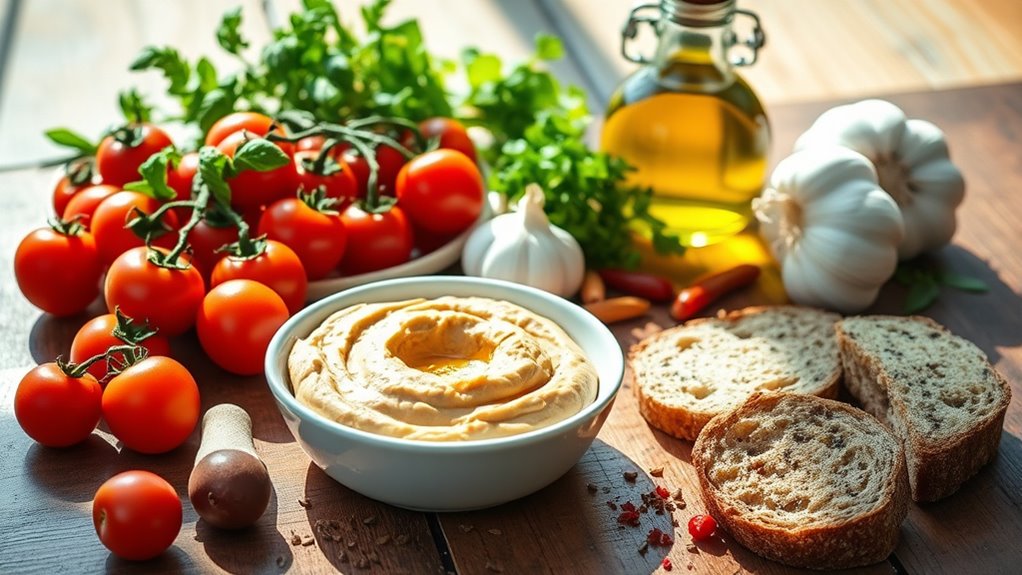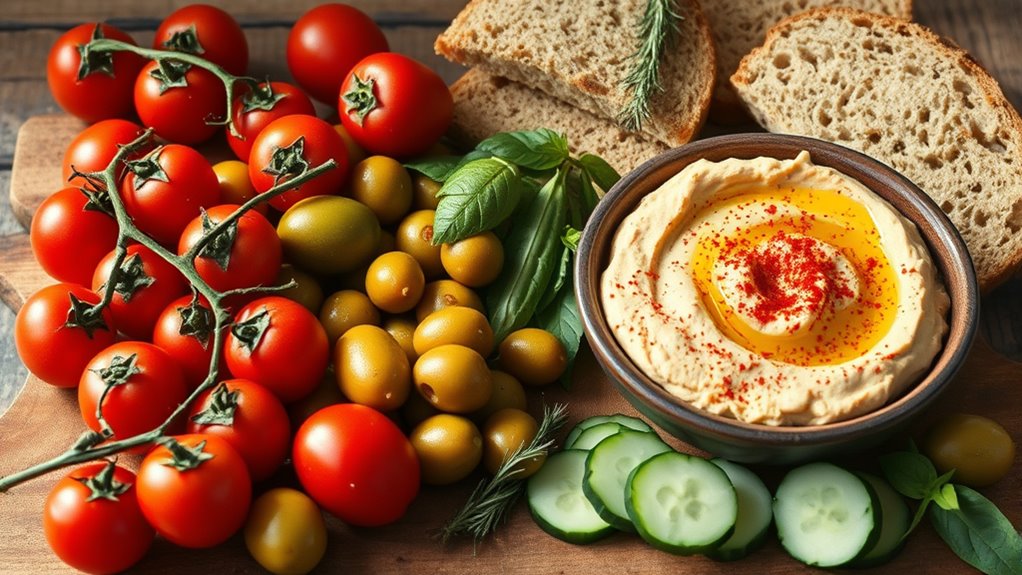To build a week’s worth of Mediterranean meals, focus on colorful fresh fruits and vegetables like tomatoes, peppers, leafy greens, and seasonal produce. Include whole grains such as quinoa and brown rice, and add legume-based dishes with lentils or chickpeas. Incorporate healthy fats from olive oil, nuts, and seeds, along with lean proteins like fish and poultry. Use herbs and spices to boost flavor naturally. Keep exploring to learn how these ingredients come together for delicious, nutritious meals.
Key Takeaways
- Incorporate colorful vegetables like tomatoes, cucumbers, and leafy greens in salads and meals for vibrant nutrition.
- Use whole grains such as brown rice, quinoa, and whole wheat bread as the foundation of meals.
- Include lean proteins like fish, poultry, and plant-based options like beans and lentils regularly.
- Enhance dishes with herbs and spices like basil, oregano, and cumin for flavor without excess salt.
- Prioritize healthy fats from olive oil, nuts, and seeds, and stay hydrated with infused water and herbal teas.
Essential Fruits and Vegetables for Your Weekly Menu

Including a variety of fresh fruits and vegetables in your weekly menu is essential for embracing the Mediterranean diet. These produce provide essential nutrients, antioxidants, and fiber that support your overall health. Opt for colorful options like tomatoes, bell peppers, leafy greens, and cucumbers, which are staples in Mediterranean dishes. Incorporate fruits such as oranges, berries, and grapes for natural sweetness and added vitamins. Using seasonal, local produce guarantees freshness and flavor while supporting sustainable practices. Keep a mix of raw and cooked vegetables to diversify your meals and maximize nutrient intake. Additionally, understanding local building codes and permits can inspire mindful eating practices that enhance your overall well-being. Staying informed about AI security vulnerabilities can help you make safer choices when exploring new health technologies or apps. By prioritizing these vibrant, nutritious foods, you’ll create meals that are both delicious and aligned with the health-promoting principles of the Mediterranean lifestyle. Incorporating relationship-building activities like shared meals can also strengthen your connection to the food and to your loved ones, making healthy eating a more enjoyable experience. Engaging in mindfulness techniques during meal preparation or consumption can further enrich your eating experience and promote better digestion and satisfaction.
Whole Grains and Legumes: Building a Nutritious Foundation

Whole grains and legumes form the backbone of the Mediterranean diet, providing sustained energy and essential nutrients. They’re versatile, filling, and rich in fiber, which helps with digestion and keeps you feeling full longer. Think whole wheat bread, brown rice, quinoa, and barley for grains. For legumes, include lentils, chickpeas, and beans in your meals. They supply protein, iron, and complex carbs, supporting overall health. Incorporate these into salads, stews, or side dishes to create a nutritious foundation for your weekly menu. Whole grains and legumes also help stabilize blood sugar levels and promote heart health. By making them a regular part of your diet, you set the stage for balanced eating and long-term wellness. Keep them in your pantry to build diverse, wholesome meals every day.
Incorporating Healthy Fats: Olive Oil, Nuts, and Seeds

Healthy fats are a cornerstone of the Mediterranean diet, offering numerous benefits for your heart and overall well-being. By incorporating olive oil, nuts, and seeds into your meals, you boost nutrient absorption and support inflammation reduction. Use extra virgin olive oil as your primary fat for drizzling over salads, roasted vegetables, or dipping bread. Nuts and seeds serve as satisfying snacks or toppings, adding crunch and healthy omega-3s. To make it easier, here’s a quick guide:
| Food Item | How to Use |
|---|---|
| Olive Oil | Salad dressings, sautéing |
| Nuts | Snack, salad topping |
| Seeds | Yogurt, smoothies, baked goods |
| Almonds | Snack, oatmeal topping |
| Chia Seeds | Puddings, breakfast bowls |
Incorporate these fats daily to enhance flavor and promote your health. Additionally, understanding the beneficial ingredients found in these foods can help maximize their health benefits. Recognizing the wide color gamut of these foods can also improve visual appeal and enjoyment of your meals. Incorporating asset division strategies can also help in managing your dietary planning more effectively, especially when navigating complex meal preparations or shared shopping responsibilities.
Lean Proteins: Fish, Poultry, and Plant-Based Options

Opting for lean proteins like fish, poultry, and plant-based options is essential for a balanced Mediterranean diet. They provide crucial nutrients while keeping saturated fat intake low. Incorporate these options into your meals with purpose and variety:
- Fish: Rich in omega-3 fatty acids, include salmon, sardines, or mackerel twice a week.
- Poultry: Choose skinless chicken or turkey for lean protein sources at lunch or dinner.
- Plant-Based Proteins: Add beans, lentils, or chickpeas to salads and stews for fiber and protein.
- Tofu and Tempeh: Use these soy-based options as versatile, plant-based protein alternatives in various dishes.
Herbs and Spices to Enhance Flavor Naturally

Would you like to add vibrant, natural flavor to your Mediterranean dishes without relying on excess salt or artificial seasonings? Herbs and spices are your best allies. Fresh basil, oregano, and parsley bring bright, aromatic notes to salads, soups, and grilled vegetables. Cumin, coriander, and paprika add warmth and depth to stews and roasted dishes. Mint and dill offer fresh, cooling accents perfect for seafood and yogurt-based sauces. Using these herbs and spices not only boosts flavor but also provides health benefits, such as anti-inflammatory properties. Keep a variety of dried and fresh options on hand to quickly elevate your meals. Incorporating cultural intelligence benefits can further enhance authenticity and nutritional value. Additionally, using culinary herbs and spices can contribute to a more authentic Mediterranean flavor profile and support overall health. Exploring traditional culinary practices can help you better understand how to combine these herbs and spices for optimal flavor. By seasoning thoughtfully with herbs and spices, you create delicious, authentic dishes that are both flavorful and nutritious.
Sample Meal Plan: Planning Your Mediterranean Week

A well-balanced Mediterranean week starts with simple breakfast options, like yogurt with fresh fruit or whole-grain bread with olive oil. For lunch and dinner, think colorful salads, grilled vegetables, lean proteins, and whole grains. Don’t forget to choose healthy snacks and beverages that keep you energized and satisfied throughout the day. Incorporating wall organization systems can also help you create a more organized space for preparing and enjoying your meals, reducing stress and making cooking more enjoyable.
Breakfast Options Overview
Starting your day with a Mediterranean breakfast sets a healthy tone for the rest of the week. To keep mornings varied and nutritious, focus on simple, flavorful options. You can incorporate fresh fruits and whole grains to fuel your day. Consider these staples:
- Greek yogurt topped with honey, nuts, and berries for a protein-packed start.
- Whole-grain toast with avocado and a sprinkle of olive oil and lemon juice.
- Fresh fruit salads with a side of nuts or seeds for added texture.
- Savory options like scrambled eggs with vegetables or whole-wheat pita filled with hummus and greens.
These choices are quick to prepare, rich in healthy fats, fiber, and antioxidants, and perfectly aligned with the Mediterranean diet‘s emphasis on fresh, wholesome ingredients.
Lunch and Dinner Ideas
Planning your lunch and dinner meals around fresh vegetables, lean proteins, and healthy oils keeps your week flavorful and nutritious. For lunches, try a vibrant Greek salad with tomatoes, cucumbers, olives, and grilled chicken drizzled with olive oil. You can also enjoy a whole-grain wrap filled with hummus, roasted vegetables, and lean turkey. For dinners, consider baked salmon seasoned with herbs, served alongside sautéed spinach and quinoa. Another option is grilled vegetable kebabs with lean beef or chicken, paired with a side of couscous. Incorporate plenty of legumes, like lentils or chickpeas, into hearty stews or salads. These meals are simple to prepare, adaptable, and keep your focus on wholesome, Mediterranean ingredients that fuel your body and satisfy your palate.
Snack and Beverage Choices
To maintain the Mediterranean diet’s health benefits, focus on choosing snacks and beverages that are natural, nutrient-dense, and minimally processed. Opt for snacks that provide healthy fats, fiber, and antioxidants to keep you energized. For beverages, prioritize hydration with options rich in nutrients. Consider these choices:
- Fresh fruit slices, like figs or berries
- A handful of nuts, such as almonds or walnuts
- Plain Greek yogurt with a drizzle of honey
- Herbal teas or infused water with lemon and mint
These selections support your overall health while satisfying your cravings. Avoid sugary drinks and processed snacks, which can undermine your goals. Staying mindful of your choices helps you enjoy the flavors and benefits of the Mediterranean lifestyle. Additionally, practicing mindful attention during meal preparation and consumption can enhance your enjoyment and promote healthier habits. Incorporating gentle yoga stretches into your daily routine can also improve digestion and reduce stress, complementing your healthy eating habits. Engaging in brewing techniques, such as preparing coffee with various methods, can also be a mindful activity that enhances your overall well-being. Being aware of the nutritional content of your snacks and drinks can further support your health goals. Incorporating paint sprayer reviews and related tips from reliable sources can help you make informed choices about your tools and projects.
Frequently Asked Questions
How Can I Adapt the Mediterranean Diet for Food Allergies?
To adapt the Mediterranean diet for food allergies, you can swap out problematic ingredients with safe alternatives. For example, if you’re allergic to nuts, try seeds like sunflower or pumpkin instead. Use gluten-free grains if you’re gluten-sensitive, and choose dairy-free options like almond or coconut milk. Focus on fresh vegetables, fruits, lean proteins, and healthy fats, customizing your meals to avoid allergens while still enjoying the diet’s health benefits.
What Are Affordable Options for Sourcing Mediterranean Staples?
You can find affordable Mediterranean staples by shopping at local markets, comparing prices, and buying in bulk. Look for seasonal produce, which is cheaper and fresher, and opt for store brands or generic options. Canned beans, lentils, and whole grains like rice are budget-friendly and versatile. Don’t forget to explore farmer’s markets or discount stores for deals on olive oil, nuts, and dried fruits, making the diet more affordable.
How Long Does It Take to See Health Benefits?
You might start noticing health benefits within a few weeks of following the Mediterranean diet, especially if you stick to it consistently. Improvements in energy, digestion, and mood can appear in as little as two to four weeks. For more significant changes like weight loss or reduced cholesterol, it could take three to six months. Keep in mind, individual results vary based on your starting point and adherence.
Can the Mediterranean Diet Be Maintained Long-Term?
You can definitely maintain the Mediterranean diet long-term. It’s sustainable because it emphasizes whole foods, healthy fats, fruits, vegetables, and lean proteins, which you can enjoy daily. Plus, it’s flexible, so you won’t feel restricted. As long as you enjoy the meals and make it fit your lifestyle, you’ll find it easy to stick with this healthy eating pattern for years to come.
Are There Suitable Vegetarian or Vegan Mediterranean Meal Options?
You’re wondering if you can enjoy vegetarian or vegan Mediterranean meals. Absolutely, you can! You can swap out seafood and meat for hearty vegetables, beans, lentils, and whole grains. You’ll find plenty of tasty options like grilled veggie skewers, chickpea salads, and stuffed peppers. By focusing on plant-based proteins and fresh produce, you keep the Mediterranean spirit alive while sticking to your vegetarian or vegan lifestyle.
Conclusion
By embracing these Mediterranean staples, you’ll enjoy vibrant, nutritious meals that boost your health. Did you know that people who follow this diet are 25% less likely to develop heart disease? Incorporating fresh fruits, whole grains, healthy fats, and lean proteins into your weekly plan not only satisfies your taste buds but also supports long-term wellness. Start building your Mediterranean week today and experience the delicious benefits firsthand!









